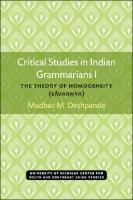Critical Studies in Indian Grammarians I
The Theory of Homogeneity (Savar?ya)
Abstract
In the historical study of the Indian grammarian tradition, a line of demarcation can often be drawn between the conformity of a system with the well-known grammar of Pa?ini and the explanatory effectiveness of that system. One element of Pa?ini’s grammar that scholars have sometimes struggled to bring across this line of demarcation is the theory of homogeneity, or savar?ya, which concerns the final consonants in Pa?ini’s reference catalog, as well as phonetic similarities between sounds. While modern Sanskrit scholars understand how to interpret and apply Pa?ini’s homogeneity, they still find it necessary to unravel the history of varying interpretations of the theory in subsequent grammars. Madhav Deshpande’s The Theory of Homogeneity provides a thorough account of the historical development of the theory. Proceeding first to study this conception in the Pa?inian tradition, Deshpande then passes on to other grammatical systems. Deshpande gives attention not only to the definitions of homogeneity in these systems but also the implementation of the theory in those respective systems. Even where definitions are identical, the concept may be applied quite differently, in which cases Deshpande examines by considering the historical relationships among the various systems.
Keywords
Sociology and anthropologyDOI
10.3998/mpub.19360Publisher
University of Michigan PressPublisher website
https://www.press.umich.edu/Publication date and place
Ann Arbor, 2020Grantor
Imprint
U OF M CENTER FOR SOUTH ASIAN STUDIESSeries
Michigan Series In South And Southeast Asian Languages And Linguistics,Classification
Sociology and anthropology


 Download
Download